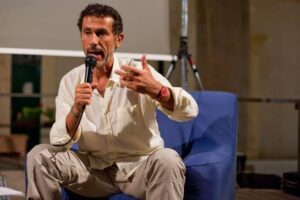By Ambra Visentin
The school says no to militarisation. An appeal against the participation of students in the Frecce Tricolori training day at the Ghedi air base has been signed by almost 300 teachers from a high school in Desenzano (Lombardy). The protest, initiated by the teacher Patrizia Londero, condemns the government’s decision to allow the proliferation of ‘educational’ initiatives with a military background, ‘while we stand by helplessly and watch the disintegration of humanitarian law in many parts of the world, the devastation of countries and peoples affected by the weapons of heaven and earth, which cause hunger and often desperate migrations’. Antonio Mazzeo, journalist and author of ‘La scuola va alla guerra’ (School Goes to War), talks to Atlas of Wars about the process of military infiltration that has developed over two decades and the importance of these protests.

What does the Desenzano protest reflect?
“The time has come for students, parents and teachers to become aware of the infiltration of the armed forces and military industries into the entire school system. The Ghedi affair is the latest in a long line. Only in recent years have individual teachers or groups of teachers realised the extent of military infiltration, and there have already been reactions.”
Any in particular?
“The most significant is the creation a year ago of a national observatory against the militarisation of schools and universities, promoted by intellectuals, university lecturers, rectors, teachers, grassroots trade unions and parts of the Catholic world such as Pax Christi.”
What are the Observatory’s findings so far?
“There have already been disturbing incidents documented: school-work exchanges organised by military industries or military bases. I live in Sicily and, unfortunately, in recent years several such protocols have been signed between the regional education office and the army command. And agreements have been signed directly between school principals and Italian commanders at the Sigonella base, the main Italian military base involved in all war scenarios.”
The Ghedi affair seems to have resonated in particular. Why is that?
“It is worrying because it concerns the whole of the school world and it comes from an installation that is one of the two Italian military bases that are home to nuclear warheads, the new B61-12. These are warheads that belong to the US armed forces, which have depots at Ghedi and Aviano, but which can be made available to the Italian armed forces in crisis situations. It is no coincidence that Ghedi recently hosted the first F-35 fighter-bombers, which are dual-use aircraft: they can carry conventional or nuclear warheads.”
How deep is the infiltration?
“Schools of all levels have been the target of these processes. The military infiltration has even reached kindergartens. We are talking about girls and boys as young as three. These are scandalous events. Kindergarten children were taken to barracks. They were made to wear military uniforms and bulletproof vests. They have been given guns to play with. A very serious matter. I hope that, like in Ghedi, it will spread throughout the country. The press is beginning to see something like what is happening today with the protests in the universities on the Palestinian issue, where there is finally an understanding of how the big military industries, I’m thinking of Leonardo, have now set foot in the universities and how these universities unfortunately contribute to rearmament projects, militarisation or cooperation with countries at war.”
Is this happening at school?
“Of course it is. For instance, Leonardo, together with the Ministry of Education, created the first experimental high school in Rome. It plans its activities directly with Leonardo staff. Leonardo provides teaching kits. It has also prepared a programme to teach first-year students about cybersecurity, artificial intelligence, automation and digitalisation.
And it is not just a question of a physical presence of the armed forces in schools or of schools in the world of the armed forces. It is also a matter of programming and even of pedagogical and didactic vision. Philosophy is part of the curriculum from the first year. But not the kind that interprets the relationship between man, history, man and the environment, but a philosophy that focuses on the ‘machine god’, automation, drones and so on.”
Why have we, as a government, allowed this?
“We are in a historical period of deep crisis, marked by permanent global war. Schools cannot remain outside this general drive towards conflict. The military apparatus must also enter schools, in view of the most dramatic scenarios that could occur in the coming years. I believe that the Russian-Ukrainian war marked a turning point. Wars have increasingly been delegated to machines. This is still a fundamental strategic point, but the war in Ukraine has shown that it is still a war of bodies, fought as in the First World War.”
What are the other reasons for this infiltration?
“They have to win the approval of the new generations. This diversification of spending to the detriment of social spending hurts the vulnerable generations. But there is, I hope, a generation of professors who are still ‘immunised’, who have enough critical sense to see these things and react.”
In short, are we building citizen-soldiers rather than citizens?
“The groundwork is being laid for the creation of a school that is a barracks and that, among other things, becomes an education in the acceptance of precariousness for life. In other words, we are going to teach that working is not a right. This is a model that the new generations cannot digest. Instead, schools should go back to reaffirming the constitutional principles of work as a right and a moment of progress.”
Cover image by yurakrasil on Shutterstock.
























